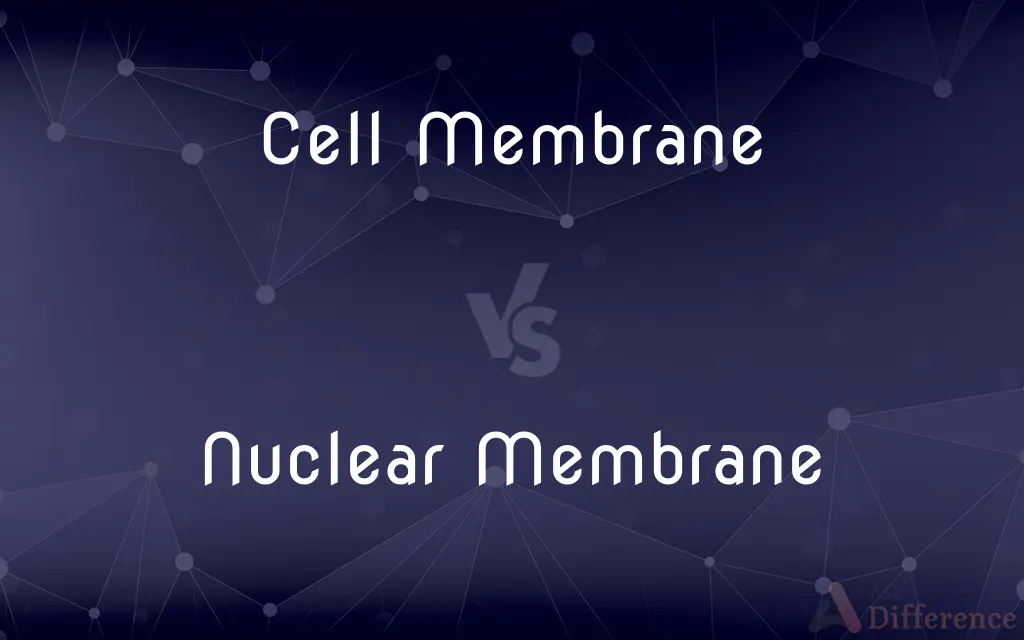Cell Membrane vs. Nuclear Membrane — What's the Difference?
By Tayyaba Rehman & Fiza Rafique — Published on October 21, 2023
The Cell Membrane encloses the entire cell and controls substance entry/exit, while the Nuclear Membrane surrounds the cell's nucleus, separating it from the cytoplasm.

Difference Between Cell Membrane and Nuclear Membrane
Table of Contents
ADVERTISEMENT
Key Differences
The Cell Membrane, also known as the plasma membrane, is the outermost boundary of the cell, separating its interior from the external environment. The Nuclear Membrane, on the other hand, envelopes the nucleus, segregating the genetic material from the cell's cytoplasm.
Both the Cell Membrane and the Nuclear Membrane play crucial roles in compartmentalizing and organizing cellular components. While the Cell Membrane is fundamental in regulating the movement of substances in and out of the cell, the Nuclear Membrane ensures the DNA remains isolated and protected within the nucleus.
The structure of the Cell Membrane is primarily characterized by a phospholipid bilayer, interspersed with proteins that aid in various cellular functions. The Nuclear Membrane, conversely, consists of two lipid bilayers, forming the inner and outer nuclear membranes, with nuclear pores allowing selective passage of molecules.
Functionally, the Cell Membrane is pivotal in maintaining cellular homeostasis by balancing the concentrations of ions and molecules inside and outside the cell. The Nuclear Membrane, apart from protecting the genetic material, also controls the flow of molecules between the nucleus and the cytoplasm through its nuclear pores.
At certain points in a cell's life cycle, the Nuclear Membrane can disintegrate, especially during processes like mitosis, only to reassemble later. In contrast, the Cell Membrane remains consistently integral, ensuring the cell's contents are contained.
ADVERTISEMENT
Comparison Chart
Location
Encloses entire cell
Surrounds cell's nucleus
Number of Bilayers
One
Two (inner and outer)
Main Function
Regulates substance entry/exit
Protects genetic material
Structural Components
Phospholipids, proteins, carbohydrates
Phospholipids, nuclear pores, proteins
Interaction with Cellular Processes
Maintains homeostasis, signal reception
DNA replication, transcription regulation
Compare with Definitions
Cell Membrane
Regulates substance transport.
The Cell Membrane allows only certain molecules to enter or exit the cell.
Nuclear Membrane
Disassembles during mitosis.
During cell division, the Nuclear Membrane breaks down to allow chromosome segregation.
Cell Membrane
A lipid bilayer surrounding a cell.
The Cell Membrane protects the cell's contents from the outside environment.
Nuclear Membrane
Consists of two lipid bilayers.
The space between the two layers of the Nuclear Membrane is called the perinuclear space.
Cell Membrane
Contains proteins and lipids.
Receptor proteins on the Cell Membrane help in receiving signals.
Nuclear Membrane
Contains nuclear pores.
Through nuclear pores in the Nuclear Membrane, RNA molecules exit the nucleus.
Cell Membrane
Provides structural integrity to cells.
Without the Cell Membrane, the cell would lack a defined shape.
Nuclear Membrane
Separates DNA from cytoplasm.
The Nuclear Membrane ensures genetic material is isolated from cellular activities.
Cell Membrane
Key in cellular communication.
The Cell Membrane has proteins that facilitate cell-to-cell communication.
Nuclear Membrane
Envelopes the cell's nucleus.
The Nuclear Membrane protects the cell's genetic material.
Common Curiosities
What is the Cell Membrane's primary role?
The Cell Membrane regulates the transport of substances in and out of the cell and protects its contents.
Where is the Nuclear Membrane located?
The Nuclear Membrane surrounds the cell's nucleus.
How does the Cell Membrane maintain cell shape?
The Cell Membrane provides structural integrity, giving the cell a defined boundary and shape.
Is cholesterol present in the Cell Membrane?
Yes, cholesterol is present in the Cell Membrane, impacting its fluidity and stability.
What happens to the Nuclear Membrane during cell division?
The Nuclear Membrane disintegrates during cell division and reassembles afterward.
Why does the Nuclear Membrane have two bilayers?
The double bilayer provides added protection to the genetic material and creates the perinuclear space.
Can substances freely pass through the Cell Membrane?
No, the Cell Membrane is selectively permeable, allowing only specific molecules to pass through.
What connects the Nuclear Membrane to the endoplasmic reticulum?
The outer membrane of the Nuclear Membrane is continuous with the endoplasmic reticulum.
Are Nuclear Membranes unique to eukaryotes?
Yes, only eukaryotic cells have a Nuclear Membrane since they have a defined nucleus.
What gives the Cell Membrane its fluid characteristic?
The lipid bilayer structure, with embedded proteins and the presence of cholesterol, gives the Cell Membrane its fluid nature.
How many lipid bilayers does the Cell Membrane have?
The Cell Membrane has one lipid bilayer.
What is the significance of the Nuclear Membrane's pores?
Nuclear pores allow selective passage of molecules between the nucleus and the cytoplasm.
How does the Cell Membrane aid in cell communication?
The Cell Membrane has receptor proteins that bind to signaling molecules, facilitating communication.
Are there proteins in the Nuclear Membrane?
Yes, the Nuclear Membrane contains proteins, including those that form nuclear pores.
Can the Nuclear Membrane regulate gene expression?
Indirectly, yes. By controlling the transport of molecules like transcription factors, the Nuclear Membrane can influence gene expression.
Share Your Discovery

Previous Comparison
Poke vs. Tickle
Next Comparison
WPA2 vs. WPA3Author Spotlight
Written by
Tayyaba RehmanTayyaba Rehman is a distinguished writer, currently serving as a primary contributor to askdifference.com. As a researcher in semantics and etymology, Tayyaba's passion for the complexity of languages and their distinctions has found a perfect home on the platform. Tayyaba delves into the intricacies of language, distinguishing between commonly confused words and phrases, thereby providing clarity for readers worldwide.
Co-written by
Fiza RafiqueFiza Rafique is a skilled content writer at AskDifference.com, where she meticulously refines and enhances written pieces. Drawing from her vast editorial expertise, Fiza ensures clarity, accuracy, and precision in every article. Passionate about language, she continually seeks to elevate the quality of content for readers worldwide.














































